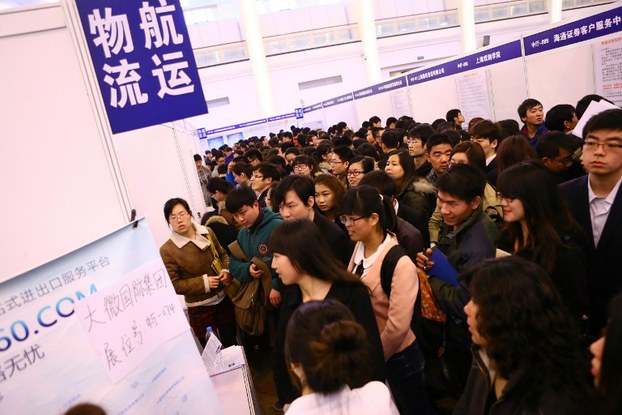 |
| Job seekers crowd stalls at a job fair in Shanghai, March 23, 2013. ImagineChina |
Amid a hostile job market for fresh Chinese graduates, the sons and daughters of ruling Chinese Communist Party officials are likely to make more money in their first job than their less well-connected peers, according to a study released this week.
The study by the China Data Center at Beijing's prestigious Tsinghua University found that the children of officials were able to command starting salaries on graduation that were, on average, 15 percent higher than those of their classmates.
The news has angered many in a year which experts have described as the toughest yet for China's 7 million fresh graduates—a large number of whom are struggling to find any work at all.
"China is in an era where everything depends on who your father is," said Chongqing-based Web editor Xiang Shaowei.
"Those whose parents are officials will definitely start at a much, much higher level than people from regular families."
Li Hongshan, deputy director of the China Data Center, told reporters last week that researchers were initially reluctant to attach specific labels of "second-generation officials" to study subjects, but that the association between being paid more and having at least one parent in public office was clear.
U.S.-based commentator and former Shandong University history professor Liu Yinquan said the privileges that come with being an official family are a direct result of the Communist Party's monopoly on power.
"In such circumstances, Communist Party officials can exert a stranglehold on privilege in any area of society," Liu said.
But he said other factors are also involved.
"A lot of Chinese parents are desperate for their children to be successful," Liu said.
"And a lot of officials will do everything in their power to further interests of their children and even their grandchildren, and to secure official posts, good jobs, and good pay and benefits for them," he added.
Test marks
According to the China Data Center, the sons and daughters of officials are more likely to land jobs in the financial sector or Party and government departments than their peers.
Xiang said that the children of the privileged are often given a boost by those in charge of evaluating them, as if by right.
"If I were the son of official parents, even if I had sat a written test honestly and done my best, by the time I got to interview, I would have had a lot of points added to my final score, to give my parents face," he said.
"But if I were the son of regular folk who sat the test ... I would have been dropped before the interview stage, even if I'd got the highest mark."
"I wouldn't have the same opportunities ... Connections are hugely important in China. Everything depends on who you know."
According to Liu, the tendency of Party cliques and factions to stick together and support each other has led to the creation of a political and economic elite with its hands on the levers of power in every area of Chinese life.
"This has given rise to worsening social inequality and a hereditary monopoly that is worse than during the feudal era," he said.
"At least in imperial times, only the Emperor was allowed to have a succession."
As the new administration of President Xi Jinping vows to fight for a cleaner and more transparent government, Chinese authorities have launched a crackdown that appears directly targeted at activists calling for the disclosure of official assets.
Police in China have detained a number of activists, lawyers, and ordinary citizens in a coordinated crackdown on the "New Citizens' Movement," after they launched a petition calling on more than 200 high-ranking Communist Party officials, including President Xi Jinping and Premier Li Keqiang, to publicly disclose their financial assets and those of their closest relatives.
Reported by Wen Jian for RFA's Mandarin service. Translated and written in English by Luisetta Mudie.
Credit & Copy From; http://www.rfa.org/english/news/china/jobs-05072013141934.html